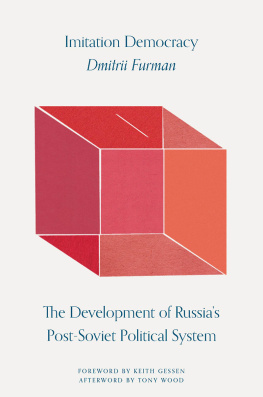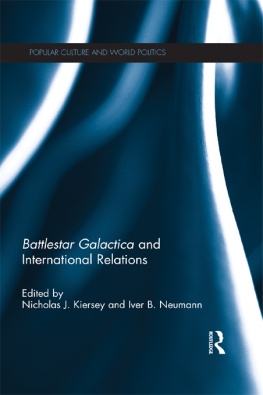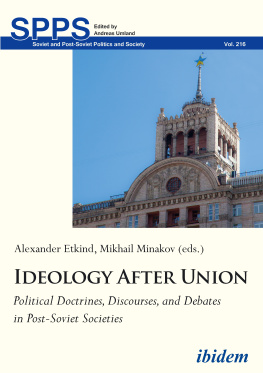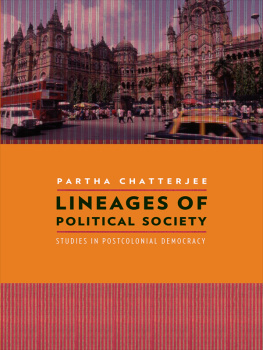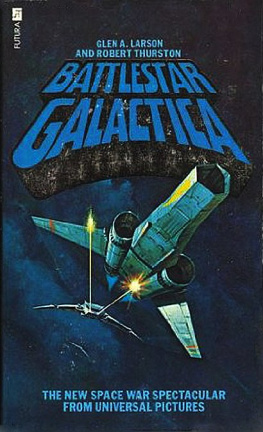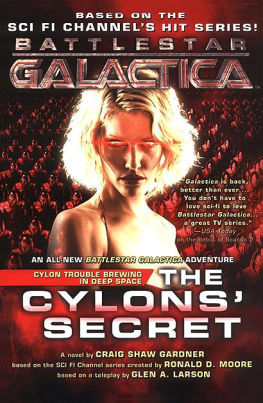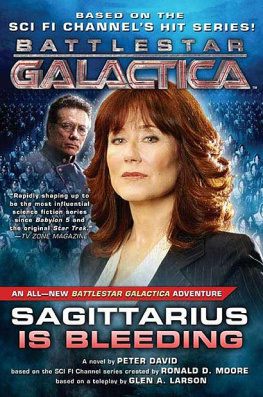Cherniavsky - Neocitizenship political culture after democracy
Here you can read online Cherniavsky - Neocitizenship political culture after democracy full text of the book (entire story) in english for free. Download pdf and epub, get meaning, cover and reviews about this ebook. City: United States;USA, year: 2017, publisher: NYU Press, genre: Politics. Description of the work, (preface) as well as reviews are available. Best literature library LitArk.com created for fans of good reading and offers a wide selection of genres:
Romance novel
Science fiction
Adventure
Detective
Science
History
Home and family
Prose
Art
Politics
Computer
Non-fiction
Religion
Business
Children
Humor
Choose a favorite category and find really read worthwhile books. Enjoy immersion in the world of imagination, feel the emotions of the characters or learn something new for yourself, make an fascinating discovery.

- Book:Neocitizenship political culture after democracy
- Author:
- Publisher:NYU Press
- Genre:
- Year:2017
- City:United States;USA
- Rating:4 / 5
- Favourites:Add to favourites
- Your mark:
- 80
- 1
- 2
- 3
- 4
- 5
Neocitizenship political culture after democracy: summary, description and annotation
We offer to read an annotation, description, summary or preface (depends on what the author of the book "Neocitizenship political culture after democracy" wrote himself). If you haven't found the necessary information about the book — write in the comments, we will try to find it.
Neocitizenship political culture after democracy — read online for free the complete book (whole text) full work
Below is the text of the book, divided by pages. System saving the place of the last page read, allows you to conveniently read the book "Neocitizenship political culture after democracy" online for free, without having to search again every time where you left off. Put a bookmark, and you can go to the page where you finished reading at any time.
Font size:
Interval:
Bookmark:
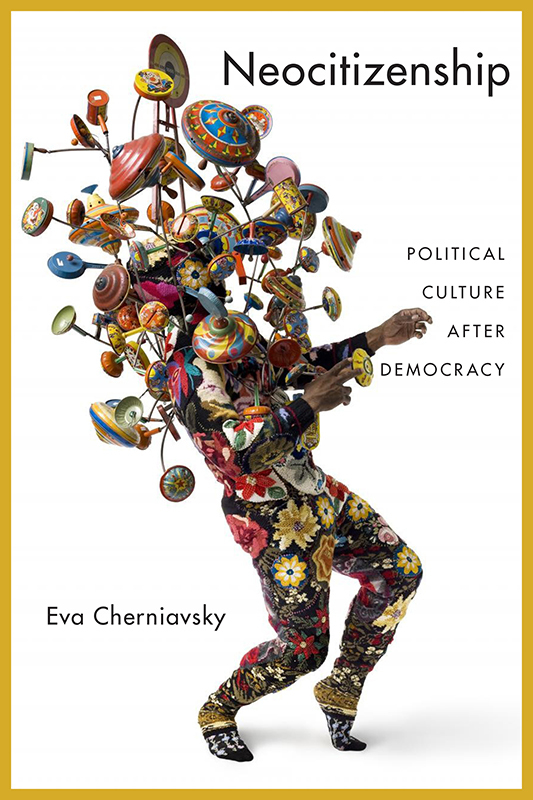
Eva Cherniavsky

NEW YORK UNIVERSITY PRESS
New York
NEW YORK UNIVERSITY PRESS
New York
www.nyupress.org
2017 by New York University
All rights reserved
Chapter 1 was previously published in Social Text 99 (Summer 2009): 123; copyright 2009, Duke University Press; reprinted by permission. An earlier and partial version of chapter 2 was published in American Studies as Transnational Practice: Turning toward the Transpacific, ed. Donald Pease and Yuan Shu, University Press of New England, 2015: 6483; copyright 2015, Dartmouth College Press; reprinted by permission. A portion of chapter 5 was published as Permanent Crisis and Technosociality in Bruce Sterlings Distraction (with Thomas Foster), Journal of American Studies, special issue on Fictions of Speculation, ed. Hamilton Carroll and Annie McClanahan, vol. 49 (2015): 119; copyright 2015, Cambridge University Press; reprinted by permission. A version of chapter 6 was published in Biography: An Interdisciplinary Quarterly, special issue on Corporate Personhood, ed. Purnima Bose and Laura Lyons, vol. 37, no. 1 (Winter 2015): 279299; copyright 2014 University of Hawaii Press for the Biographical Research Center; reprinted by permission.
References to Internet websites (URLs) were accurate at the time of writing. Neither the author nor New York University Press is responsible for URLs that may have expired or changed since the manuscript was prepared.
ISBN : 978-1-4798-8091-1 (hardback)
ISBN : 978-1-4798-9357-7 (paperback)
For Library of Congress Cataloging-in-Publication data, please contact the Library of Congress.
New York University Press books are printed on acid-free paper, and their binding materials are chosen for strength and durability. We strive to use environmentally responsible suppliers and materials to the greatest extent possible in publishing our books.
Manufactured in the United States of America
10 9 8 7 6 5 4 3 2 1
Also available as an ebook
for my boys
The moment of finishing a manuscript always feels a little improbable. Nothing restores ones relation to the continuum of lived time better than the ritual of acknowledging ones debts and the duration over which they have accrued. My earliest ruminations on this project began while I was still at Indiana, in the first years of the new millennium. My colleagues and allies in our hastily assembled Progressive Faculty Coalition, especially Pat Brantlinger, Milton Fisk, Mike Gasser, Joan Hawkins, Roopali Mukerjee, and Janet Sorenson, provided an early, invaluable sounding board and inspiration. At the University of Washington, an excellent cohort of students in my winter 2007 graduate course on Theories and Representations of the State helped me to a new sense of the draw and the urgency of my topic, while in spring 2014, the participants in my seminar on feminist theory vitalized my thinking in the final stages of revision. During the intervening years, an exceptionally talented group of dissertators were steady and important interlocutors: Curtis Hisayasu, Jason Morse, Jed Murr, Christian Ravela, Andrew Rose, Suzanne Schmidt, Simn Trujillo, and Kate Boyd, the last of whom was also a wonderful and patient research assistant.
In Seattle and elsewhere, an array of friends and colleagues have spurred my thinking on this book, sustained my sometimes eroding faith in the merits of my topic, and (or) helped me to stay (relatively) sane in the increasingly strange and dysfunctional world of the academy: Carolyn Allen, Hamilton Carroll, Kate Cummings, Helen Deutsch, Laurie George, Laura Lyons, Michael Meranze, Jan Radway, Laura Shackelford, Gail Stygall, Nikhil Singh, and Matt Sparke. The Octavians, SF/fantasy reading group extraordinaire, have honed my relation to the SF materials in this book in ways large and small, and I am especially grateful to Ted Chiang, Nisi Shawl, and Neil Roseman. For the opportunity to present portions of this work in progress, many thanks to Wang Ning, Donald Pease, Tyrone Simpson, and Yuan Shu.
Since 2005, the Andrew R. Hilen endowment at the University of Washington has provided me with indispensable summer research support, and I am immensely grateful to the Hilen family for their generous commitment to humanities scholarship at UW. At New York University Press, Eric Zinner has been an ideal editor. He and Alicia Nadkarni have made the review process swift, painless, and hugely productive. Effusive thanks are due my two anonymous readers at the press for their thoughtful readings and excellent, detailed suggestions.
Two friends have been with this project throughout, our many conversations reflected and refracted here in ways I can hardly unravel: my deepest thanks and appreciation to Purnima Bose, unapologetic fellow traveler, and to Robyn Wiegman, for the peripatetic object lessons. My son, Ivan Foster, has not only tolerated with good humor and good grace my absorbed (not to mention ill-tempered) state during phases of the writing of this book, but his own still-emerging sensitivity to the surreal quality of contemporary politics as to the workings of genre fiction inhabit and inform this book in countless ways. For almost a quarter of a century now, my partner, Tom Foster, has shared with me his brilliant grasp of contemporary techno-culture, his encyclopedic knowledge of SF, his irreverence, and his unfailing sense of what matters. He has read multiple chapters in multiple drafts, weathered my bouts of worry and frustration, and been tireless in his encouragement. This book is dedicated to Tom and Ivan, who are in every way imaginable the lights of my life.
This book is concerned with the relations of subjects to governments that have been historically organizedinculcated, institutionalized, practiced, imaginedas the condition of citizenship. Like other studies of political culture on the Left, Neocitizenship is animated by the perception that we are living in the midst of a momentous reconfiguration of political order, which seems increasingly to represent either a new stage of capitalism or, perhaps, the beginning of its enda moment marked, in Slavoj ieks words, by the dissolution of that historic marriage between capitalism and democracy (quoted in Shin 2011).
The policies and practices that have set the conditions of this divorce are generally studied under the heading of neoliberalism, and following Foucault, studies of neoliberalism have tended to dwell on the relation of economics to the micro-politicalto the institutions of the state and civil society as they produce and reproduce a new kind of self-optimizing, entrepreneurial citizen-subject, accommodated to life in the world of deregulated market freedoms. It is only more recently that critical thought on neoliberalism has addressed the macro-political, the gravitation of capitalist states to fundamentally oligarchical and autocratic forms of government, a gravitation that I describe in this book as the dismantling of the modern political field. This is by no means to suggest that oligarchy and autocracy are not endemic to political modernity, but rather to note a shift in the direction of political life, marked by the erosion of democratic governance in the regions where it was, historically, most developed and secure. So it comes to pass that the political situations and crises we assigned, not so long ago, to the backward arenas of the neocolonial client stateelectoral fraud, the buying of political office, routine violations of due process, invasive state surveillance and the suspension of civil rightsare now, increasingly, descriptive of life in the West and Western-style democracies of the world, and perhaps no place more consistently than in the United States.
Next pageFont size:
Interval:
Bookmark:
Similar books «Neocitizenship political culture after democracy»
Look at similar books to Neocitizenship political culture after democracy. We have selected literature similar in name and meaning in the hope of providing readers with more options to find new, interesting, not yet read works.
Discussion, reviews of the book Neocitizenship political culture after democracy and just readers' own opinions. Leave your comments, write what you think about the work, its meaning or the main characters. Specify what exactly you liked and what you didn't like, and why you think so.

